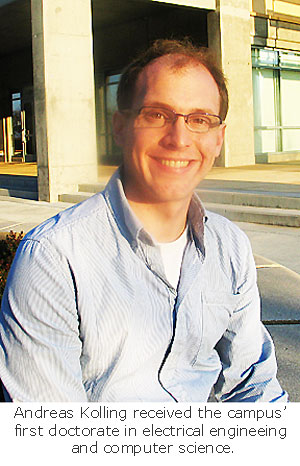

UC Merced recently celebrated another laudable academic first.
Andreas Kolling became the campus’ first student to graduate with a
doctoratein
electrical engineering and computer sciencewhen he successfully defended his dissertation, “Multi-Robot Pursuit-Evasion,” in December.
Kolling, who was born and raised in northern Germany, completed his research under the guidance of
Professor Stefano Carpin.
Before coming to UC Merced, he was a student at Jacobs University in Bremen, Germany where he met Carpin. When Carpin assumed his faculty position at UC Merced, Kolling had to decide whether to stay at Jacobs, which already had an established reputation for its robotics program, or join Carpin at the newest UC campus in the San Joaquin Valley.
A visit solidified his decision to attend and he started in January 2007.
“I was familiar with what it takes to build up a university,” he said, referring to attending Jacobs which opened its doors in 2001. “There are advantages and disadvantages.”
One plus, Kolling noted, was the attention he received from UC Merced’s world-class faculty members.
“You get intensive advising here,” he said. “(Students) are pushed to succeed here. And it’s not just about the work. You learn that making good contacts and networking are essential too.”
While at UC Merced, Kolling developed robotic systems for search, surveillance and reconnaissance. The robots could be deployed when there’s a significant risk of danger, such as search and rescue operations in a collapsed building or disaster area. He designed algorithms to analyze maps and determine the kind and number of robots that would be needed to ensure that all victims would be recovered. He formulated algorithms to control large teams of robots to search through complex environments autonomously.
He also contributed part of the code for UC Merced’s winning
RoboCup teamin 2009.
Kolling recently started a postdoctoral fellowship with a primary appointment at the University of Pittsburgh working on grants from the Air Force Office of Scientific Research’s Multidisciplinary University Research Initiative and the Office of Naval Research’s Science of Autonomy Program at the Robotics Institute at Carnegie Mellon University.
He looks forward to working closely with collaborators from the Robotics Institute and psychology departments at Carnegie Mellon, and robotics researchers from Massachusetts Institute of Technology, Cornell University, George Mason University and Brigham Young University.






